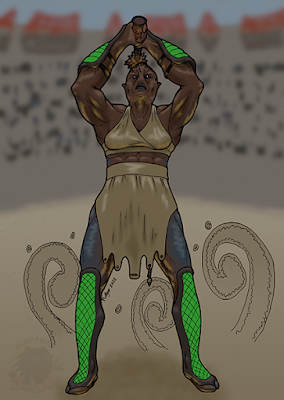We ran a micro-interview with Sarah Day, author of “The Heart of the Party” in The Future Fire #62.
TFF: What does “The Heart of the Party” mean to you?
 |
| Illustration © 2022 Miguel Santos |
Sarah Day: “The Heart of the Party” is an exploration of the consensuality of inclusion, basically—that we opt in to communities as much as we may perceive ourselves to be validated or included by a community's inclusion of us. Clear self-expression is a key value that contributes to how I practice my various identities, whether that means which ones I choose to express in a given moment, or the ones that are applied to me by social mores or stereotypes. Consciously choosing your community is way more empowering than accepting the defaults assigned to you, and I think that comes through pretty clearly in the text.
TFF: If a device enabled to share thought and emotions with other people, would you connect to it?
SD: No. I feel enough of people's emotions already without additional wetware. I also work in tech—it's impossible for me to imagine new technology without imagining its commercial or society-wide applications. The idea of normalizing shared emotions among the general populace sounds like a bit of a gender and racial nightmare. Even with all my privilege, I still experience the expectations around silent emotional labor applied to most women, and I definitely wouldn't want to give people more of a reason to expect that I would be doing more of that because I could perceive their feelings and thoughts. And like most power structures, the farther you get from being a straight able-bodied cis white man, the worse I imagine this would go: feeling the barista's racism as you queue up for your morning coffee, hearing a passerby's ableist thought as they navigate around your wheelchair. That's a hard no from me.
TFF: What are you working on next?
SD: I just sold my debut novella, Greyhowler, to Mark Teppo of Underland Press!
Extract:
Staring at the Patrollers across the street, I worried at my crippled implant the way I would work my tongue in an empty tooth socket, trying for the millionth time to activate it. No joy. The frizz of feedback in my hand told me they were still communicating, but the hardware was too damaged for me to hear them. I could guess their conversation, though; they were trying to understand why I’d flash an implant scar at them in broad daylight. Use of networking technology by civilians was illegal, and I was clearly a civilian.
Reminder: You can comment on any of the stories or illustrations in this issue at http://press.futurefire.net/2022/07/new-issue-202262.html



